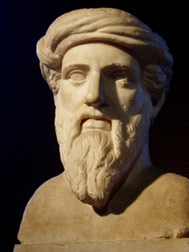The impact of Pythagorean philosophy
 Most pre-Socratic philosophers tried to unravel the mystery of the
universe in different ways. For instance, Thales gave a non-religious
explanation of the cosmos in the 6th century BCE. He was the founder of
the Milesian School of Philosophy. Pythagoras too was born in Miletus,
Greece. Although very little is known about him, Pythagoras is believed
to have studied at the Milesian School of Philosophy. He is also known
to have visited Egypt, the cultural hub of the ancient world, where he
learnt the rudiments of geometry. As a result, Pythagoras approached
philosophy in a scientific way. Most pre-Socratic philosophers tried to unravel the mystery of the
universe in different ways. For instance, Thales gave a non-religious
explanation of the cosmos in the 6th century BCE. He was the founder of
the Milesian School of Philosophy. Pythagoras too was born in Miletus,
Greece. Although very little is known about him, Pythagoras is believed
to have studied at the Milesian School of Philosophy. He is also known
to have visited Egypt, the cultural hub of the ancient world, where he
learnt the rudiments of geometry. As a result, Pythagoras approached
philosophy in a scientific way.
Unlike many western philosophers, Pythagoras was a deeply religious
person who believed in superstitions. He believed in reincarnation and
the transmigration of the soul. With that background, he set up a
religious cult with himself as its leader or messiah. His disciples had
to follow a strict code of ethics and dietary rules. The Pythagoreans or
his ardent pupils believed that his ideas were mystical revelations.
|

Reason is immortal, all else mortal.
- Pythagoras (c.570-495 BCE) |
Pythagoras has not left any of his writings. As a result, we do not
know what he taught his students. Modern scholars, however, believe that
Pythagoras had about 300 pupils in his academy. At the age of 60 he got
married to a young girl who eventually became one of his pupils. When
hostility grew towards the Pythagorean cult in Croton, he fled to
Metapontum where he died later. The Pythagorean cult disappeared at the
end of the 4th century BCE.
Contradictory concepts
Pythagoras’ philosophy comes to us through the records kept by his
students, wife and two daughters. Today mysticism and science are two
contradictory concepts. However, he did not consider them to be
contradictory. The Buddha said that the final goal of life should be the
cessation of birth. Similarly, Pythagoras said that the goal of life is
freedom from the cycle of reincarnation. The Buddha and Pythagoras
advocated strict adherence to a set of behavioural rules.
Pythagoras depended heavily on mathematical proof rather than
observations. He said even the cosmos was governed by mathematical
rules. Modern philosophers, however, look at the world from a different
perspective. They do not rely purely on mathematical rules. The
Pythagorean explanation of the creation of the universe was based on a
mathematical pattern. However, he believed that God imposed a limit to
everything that exists in the world. Out of this measurable unity
everything else was formed.
Pythagoras’ most important contribution to philosophy is the
relationship between numbers. He said, “Number is the ruler of forms.”
Another contribution made by him is the principle of deductive
reasoning. It plays a major role in logic along with inductive or
scientific reasoning. Deductive reasoning is the step-by-step process of
starting with self-evident axioms to arrive at a conclusion. The
following syllogism is a popular example for deductive reasoning:
All men are mortal.
Socrates is a man.
Therefore, Socrates is mortal.
As far as philosophy is concerned Pythagoras said that abstract
theory is superior to the evidence of the senses. This led to Plato’s
Theory of Forms.
Cosmic harmony
According to Pythagoras, the universe is an ordered whole consisting
harmonies of contrasting elements. The Pythagoreans were the first to
use the term “Cosmos” which means “ordered whole.” In contrast to the
nearly mystical quality of the Heraclitean “Logos”, Pythagorean cosmos
is accessible to arithmetic, geometry and rationality.
The Pythagoreans coined the term “celestial music of the spheres” to
describe the sound of the heavens as they rotate according to cosmic
numbers and harmony.
After the execution of Socrates, Plato left Athens and wandered for
12 years. Apart from studying mathematics and mysticism, he learnt
Pythagorean philosophy which relied heavily on mathematics as the basis
of everything. This shows the impact of Pythagorean philosophy on later
philosophers such as Plato.
Aesara of Lucania, a Pythagorean philosopher said, “Through the
introspection of contemplation of our own souls we can discover the
‘natural’ foundation of all law and the structure of morality.” She
stressed the importance of reason as a guide, without overcoming the
significance of emotions. Aesara is one of the few women philosophers
who came to prominence in recent times. The impact of Pythagorean
philosophy can be seen even in modern philosophy to a great extent. |

